 W
WAblepharus is a genus of skinks that contains the common snake-eyed skinks. Both their scientific and common names refer to the fact that their eyelids have fused to a translucent capsule; as in snakes, they thus are physically incapable of blinking. They are small lizards and prefer to live in the leaf litter of dry fields and hills. Their scales give them a very shiny, bronze appearance with a characteristically dark stripe down the sides of their bodies. They prey on small insects and other small mollusks.
 W
WAblepharus budaki, commonly known as Budak's snake-eyed skink, is a species of skink, a lizard in the family Scincidae. The species is endemic to the Near East.
 W
WAblepharus kitaibelii, commonly known as the European copper skink, European snake-eyed skink, juniper skink, or snake-eyed skink, is a species of skink, a lizard in the family Scincidae. The species is endemic to Eastern Europe and Southwestern Asia.
 W
WAcanthosaura phuketensis, the Phuket horned tree agamid, is a species of arboreal lizard native to Phuket Province, Thailand. It was discovered in 2015. It is now the 11th species in the genus Acanthosaura.
 W
WAltiphylax stoliczkai, also known commonly as the frontier bow-fingered gecko, the Baltistan gecko, and the Karakorum gecko is a species of lizard in the family Gekkonidae. The species is endemic to South Asia.
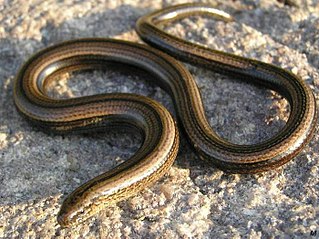 W
WAnguis fragilis is a reptile native to Eurasia. It is also called a deaf adder, a slowworm, a blindworm, or regionally, a long-cripple, to distinguish it from the Peloponnese slowworm. These legless lizards are also sometimes called common slowworms. The "blind" in blindworm refers to the lizard's small eyes, similar to a blindsnake.
 W
WThe Bengal monitor or common Indian monitor, is a monitor lizard found widely distributed over the Indian Subcontinent, as well as parts of Southeast Asia and West Asia. This large lizard is mainly terrestrial, and its length can range from about 61 to 175 cm from the tip of the snout to the end of the tail. Young monitors may be more arboreal, but adults mainly hunt on the ground, preying mainly on arthropods, but also taking small terrestrial vertebrates, ground birds, eggs and fish. Although large monitors have few predators apart from humans who hunt them for meat, younger individuals are hunted by many predators.
 W
WBosc's fringe-toed lizard or Bosk's [sic] fringe-fingered lizard is a species of lizard in the family Lacertidae. The species is endemic to North Africa and Western Asia. Three subspecies are sometimes recognised; A. boskianus boskianus, from Lower Egypt; A. boskianus euphraticus from Iraq; and A. boskianus asper from the rest of the range; however this division is unsatisfactory because each subspecies has much variation and the differences between them are not consistent.
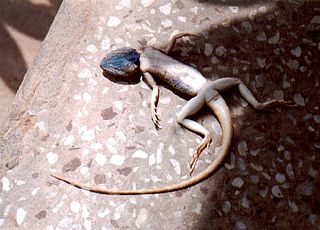 W
WThe brilliant ground agama is a species of agama found in Central, West and South Asia, in Iran, Pakistan, India, Russia, Turkmenistan, Tajikistan, Uzbekistan, Kazakhstan, China, possibly Iraq, and Afghanistan.Race khuzistanensis: Type locality: Iran, Khuzistan Province, 5 km northwest of Haft-Gel on the road to Shushtar Race pakistanensis - southeastern Pakistan and adjacent northwestern India: Type locality: Gaj-River, Kirthar Range, southeastern Pakistan
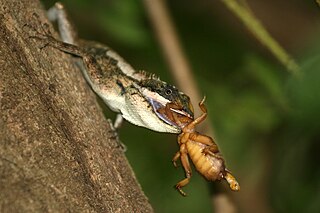 W
WCalotes ceylonensis, commonly known as the painted-lipped lizard or the Sri Lanka bloodsucker, is a species of lizard in the family Agamidae. It is one of four Calotes species endemic to Sri Lanka.
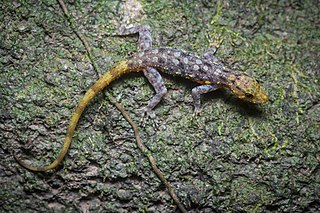 W
WThe Chanthaburi rock gecko is a species of geckos found in Cambodia and eastern Thailand.
 W
WChernov's skink is a species of skinks, a lizard in the family Scincidae. The species is endemic to northern Eurasia.
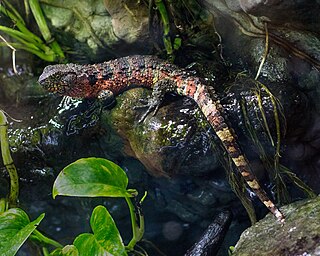 W
WThe Chinese crocodile lizard is a semiaquatic lizard found only in cool forests in the Hunan, Guangxi and Guizhou Provinces of southern China, and the Quảng Ninh Province in northern Vietnam. The Chinese crocodile lizard spends much of its time in shallow water or in overhanging branches and vegetation, where it hunts its prey of insects, snails, tadpoles, and worms. Individuals in captivity may be fed baby mice. A rare and little-studied lizard, it is listed in CITES Appendix II, which regulates international trade of specimens. This is the only species in the monotypic genus Shinisaurus.
 W
WCnemaspis is a genus of diurnal (day) geckos found in Africa and Asia. With over 100 species, it is one of the most diverse genera of geckos. Molecular phylogenies suggest that the three regional groupings may form distinct clades which are not each other's closest relatives.
 W
WThe common butterfly lizard, or simply butterfly lizard, is a widespread species native to Asia.
 W
WThe common chameleon or Mediterranean chameleon, together with the African chameleon, C. africanus, is one of only two extant species of Chamaleonidae with a range that extends into Europe.
 W
WThe common house gecko, is a gecko native to Southeast Asia. It is also known as the Asian house gecko, Pacific house gecko, wall gecko, house lizard, or moon lizard.
 W
WThe common leopard gecko is a nocturnal, ground-dwelling lizard native to the rocky dry grassland and desert regions of Afghanistan, Iran, Pakistan, India, and Nepal. The common leopard gecko has become a popular pet, and due to extensive captive breeding, is sometimes referred to as the first domesticated species of lizard.
 W
WCyrtodactylus adleri is a species of bent-toed gecko, a lizard in the family Gekkonidae. The species is native to southern Asia.
 W
WCyrtodactylus jeyporensis, also known as the Jeypore Indian gecko, the Jeypore ground gecko, or the Patinghe Indian gecko, is a endangered species of gecko found in India, which was until recently considered extinct. Described from a single specimen in 1877, it was rediscovered in 2010 in the Eastern Ghats of Odisha state, India.
 W
WDutta’s Mahendragiri gecko is a species of large gecko found in Andhra Pradesh in India.
 W
WThe earless monitor lizard is a semiaquatic, brown lizard native to the Southeast Asian island of Borneo. It is the only living species in the family Lanthanotidae and it is related to the true monitor lizards.
 W
WThe genus Eumeces comprises four African to Middle-Eastern skink species.
 W
WGeckos are small lizards belonging to the infraorder Gekkota, found in warm climates throughout the world. They range from 1.6 to 60 cm.
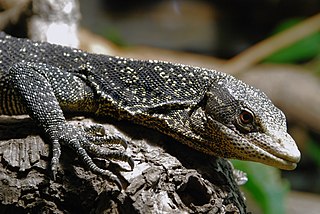 W
WThe golden-spotted tree monitor is a species of monitor lizard endemic to Waigeo Island in Indonesia.
 W
WGonocephalus doriae is a species of arboreal lizard in the family Agamidae. The species is endemic to the island of Borneo.
 W
WKotschy's gecko is a species of gecko, a lizard in the family Gekkonidae. The species is native to southeastern Europe and the Middle East. It is named in honour of the Austrian botanist and explorer Karl Georg Theodor Kotschy.
 W
WLaudakia tuberculata is a species of agamid lizard found in northern Pakistan, northern India, Nepal, eastern Afghanistan, and western China.
 W
WCeratophora tennentii, commonly known as the horned lizard, horn-nosed lizard, leaf-nosed lizard, and Tennent's leaf-nosed lizard, is a species of lizard in the family Agamidae. The species is endemic to Sri Lanka.
 W
WLeiolepis, commonly known as butterfly lizards or butterfly agamas, are group of agamid lizards. They are native to Peninsular Malaysia, Thailand, Myanmar, Laos, Cambodia, Indonesia, Ryukyu Islands (Japan), Vietnam, and Hainan (China). The genus includes both sexual and asexual species. Leiolepis is the sole genus of subfamily Leiolepidinae.
 W
WThe Mediterranean house gecko is a type of house gecko common to the Mediterranean area which has spread to many parts of the world. It is commonly referred to as the Turkish gecko as represented in its Latin name and also as the moon lizard because it emerges in the evening.
 W
WThe Mussau Island blue-tailed monitor or Mussau monitor is a species of monitor lizard endemic to Mussau Island in Papua New Guinea. It belongs to the Varanus doreanus species complex.
 W
WOphisops elegans, commonly known as the snake-eyed lizard, is a species of lizard in the family Lacertidae. The species is endemic to the Mediterranean region and Central Asia. There are nine recognized subspecies.
 W
WPlestiodon elegans, the five-striped blue-tailed skink or Shanghai skink, is a species of lizards in the genus Plestiodon found in East Asia.
 W
WPseudocalotes austeniana, commonly known as the Abor Hills agama or Annandale's dragon, is a rare species of agamid lizard endemic to Asia.
 W
WPseudopus is a genus of anguid lizards that are native to Eurasia. One extant species remains, the sheltopusik, with four fossil species. They are the most robust members of subfamily Anguinae.
 W
WThe rhino-horned lizard, also commonly known as Stoddart's unicorn lizard and the horned agama, is a species of lizard in the family Agamidae. The species is endemic to Sri Lanka. It is called kagamuva angkatussa-කගමුව අං කටුස්සා in Sinhala.
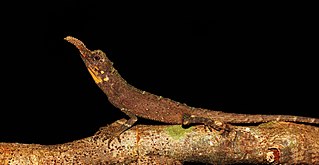 W
WThe rough-nosed horned lizard is an Agamid lizard from Sri Lanka in lowland dipterocarp forests and secondary forests in the wet zone. It is distinguished from all the other Ceratophora species by the presence of a complex rostral appendage, comprising more scales than rostral scale alone. The lateral body scales are small and more or less regular shape.
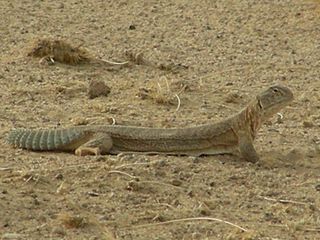 W
WSaara is a genus of agamid lizards in the subfamily Uromasticinae. The genus is endemic to Asia.
 W
WSalea is a genus of arboreal, slow-moving, diurnal, insectivorous, egg-laying agamid lizards endemic to the Western Ghats of South India. It has two species, each inhabiting very high mountainous tracts of the Western Ghats in the Shola forest ecosystems.
 W
WThe sand lizard is a lacertid lizard distributed across most of Europe including Britain, France, Belgium, the Netherlands, Denmark, southern Sweden, Germany, Austria, Slovenia, Romania, Croatia, Bosnia and Herzegovina, Serbia, Montenegro, Macedonia, Albania, Kosovo, Hungary, Czech Republic, Slovakia, Poland, Ukraine, Belarus, Western Russia and eastwards to Mongolia and northwest China. It does not occur in the Iberian peninsula or European Turkey. Its distribution is often patchy.
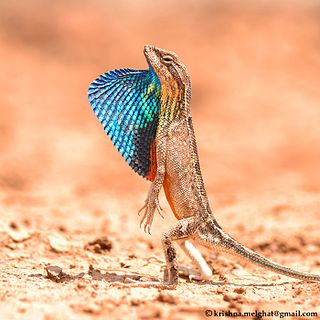 W
WSarada is a genus of lizards in the family Agamidae. Common name large fan-throated lizards has been coined for this genus. It is the sister genus of Sitana; together they form a group known as the fan-throated lizards. The genus, consisting of three species, was erected in 2016 on the basis of molecular phylogenetic studies from across peninsular India.
 W
WSavigny's agama is a species of lizard in the family Agamidae. The species is native to the Levant.
 W
WScincella vandenburghi, also known commonly as the Korean skink, the Tsushima ground skink, and the Tsushima smooth skink, is a species of skink, a lizard in the family Scincidae. The species is endemic to East Asia
 W
WThe sheltopusik, also commonly called Pallas's glass lizard or the European legless lizard, is a species of large glass lizard found from Southern Europe to Central Asia.
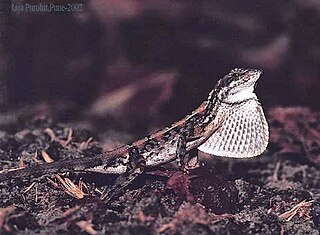 W
WSitana is a genus of lizards, collectively known as the fan-throated lizards, from the family Agamidae. They are found in Nepal, India, Sri Lanka and Pakistan. The genus comprises thirteen species, including several recently discovered species, such as two new species from Sri Lanka. In 2016, a new genus named Sarada was erected, consisting of one former Sitana species and two newly described ones. Sarada is the sister genus of Sitana. Together they form a clade which sister group is Otocryptis.
 W
WThe limbless skink is a species of skink, a lizard in the family Scincidae.
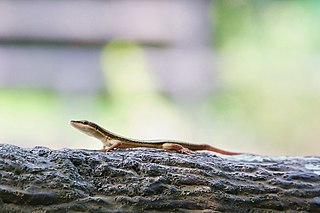 W
WTakydromus kuehnei is a species of lizard in the family Lacertidae. It is found in China, Taiwan, and Vietnam.
 W
WTarentola mauritanica, known as the common wall gecko, is a species of gecko (Gekkota) native to the western Mediterranean area of North Africa and Europe and has since been introduced to Madeira, Canary Islands and Balearic Islands, and the Americas. It is commonly observed on walls in urban environments, mainly in warm coastal areas. However, it can be found further inland, especially in Spain where it has a tradition of cohabitation with humans as insect hunter. A robust species, up to 15 centimetres (5.9 in) long, its tubercules are enlarged and give the species a spiny armoured appearance. It is a nocturnal animal with a predominantly insectivorous diet.
 W
WTytthoscincus is a genus of skinks. Originally defined to include a few species from the Philippines, the genus now includes many species from South-East Asia in general.
 W
WTytthoscincus temasekensis, common name Singapore swamp skink, is a species of skinks belonging to the family Scincidae.
 W
WThe veiled chameleon is a species of chameleon native to the Arabian Peninsula in Yemen and Saudi Arabia. Other common names include cone-head chameleon and Yemen chameleon.
 W
WThe viviparous lizard, or common lizard, Zootoca vivipara, is a Eurasian lizard. It lives farther north than any other species of non-marine reptile, and most populations are viviparous, rather than laying eggs as most other lizards do. It is the only species in the monotypic genus Zootoca. Both "Zootoca" and "vivipara" mean "live birth," in Greek and Latin respectively. It was called Lacerta vivipara until the genus Lacerta was split into nine genera in 2007 by Arnold, Arribas & Carranza.